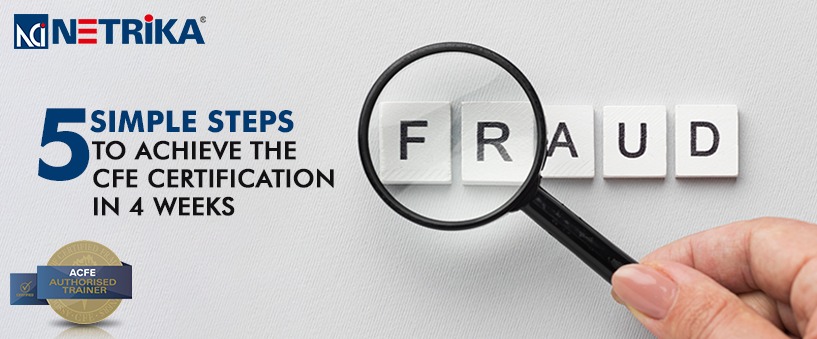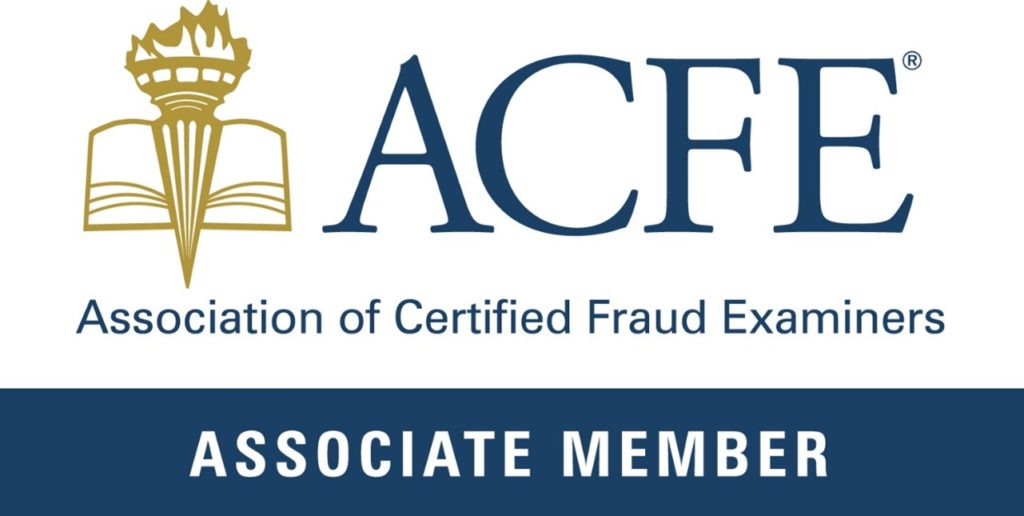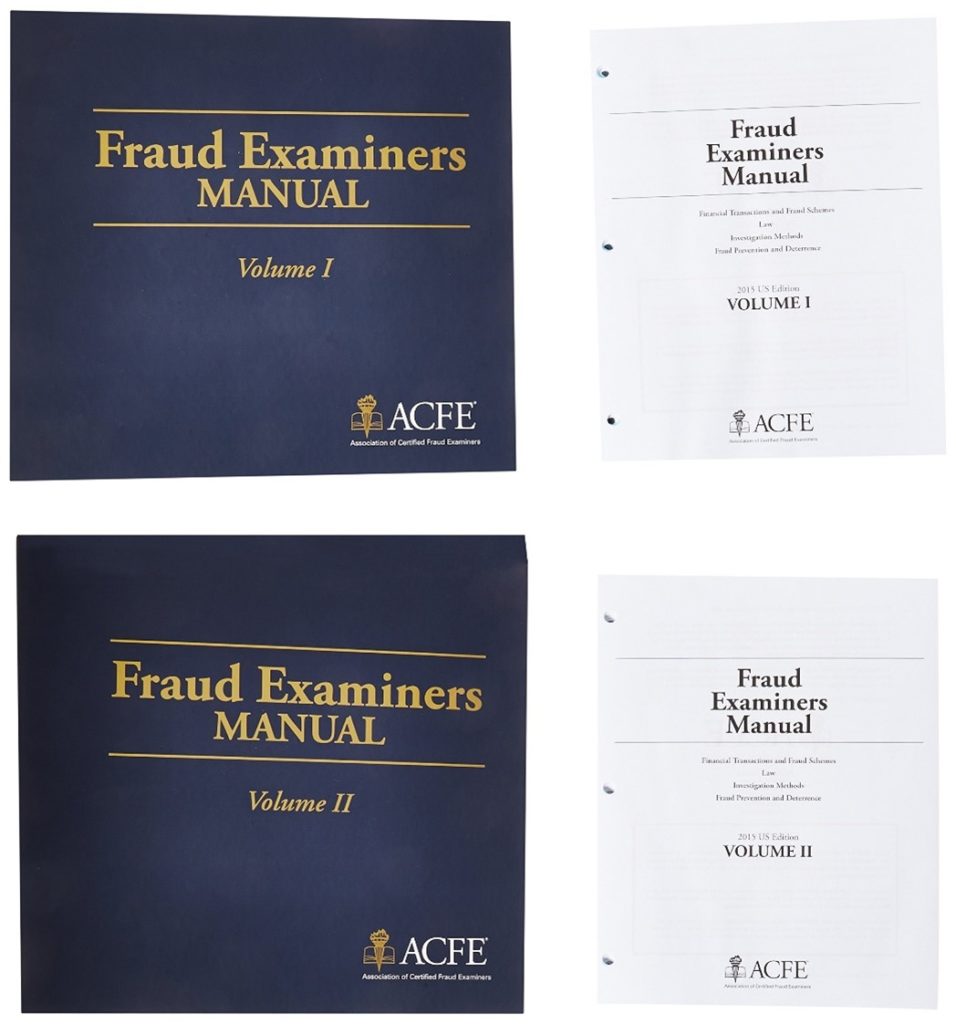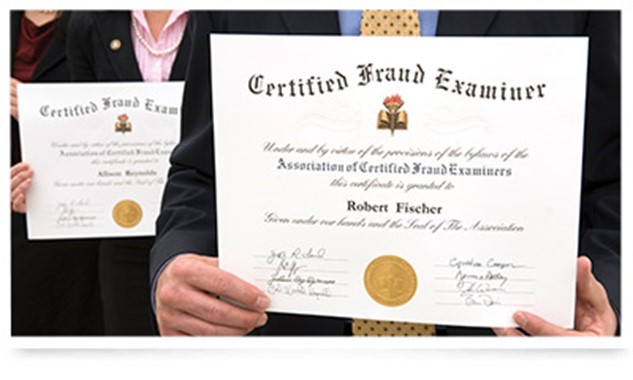
5 Simple Steps To Achieve The CFE Certification In 4 Weeks
Steps To Achieve The CFE Certification In 4 Weeks-Association of Certified Fraud Examiners | ACFE India
One may think that CFE certification makes the fraud professional superior, but they do not realise the hard work behind it. Being a fraud professional is a lifelong learning process, as the professionals stay up to date with the latest laws and regulations that govern their field. CFEs possess expert accounting skills and in-depth knowledge of different types of frauds and fraud risk faced by companies.
Earning a professional certification makes the fraud examiner filled with pride, but with the professional certificate comes the great responsibility of protecting the company from fraud. With superior power, CFEs often enjoy many benefits throughout their careers as higher salaries and increased job security.
Take the 5 simple steps to achieve the CFE certification in 4 weeks with the CFE Exam Review Course. The ACFE authorised trainers in India will guide and train the delegates with 32 hours of dedicated meeting room training on core subjects, fine-tuned with the examination pattern.
5 Tips to Help You Pass the CFE Exam
Earning the Certified Fraud Examiner (CFE) certification is a prestigious accomplishment for professionals pursuing careers in fraud detection, prevention, and investigation. This certification, offered by the Association of Certified Fraud Examiners (ACFE), signifies your expertise in the field of fraud management.
Here are five straightforward steps to help you achieve the CFE certification:
1. Meet Eligibility Requirements: Before embarking on your journey towards CFE certification, ensure that you meet the ACFE’s eligibility criteria. Typically, this entails possessing a bachelor’s degree from an accredited institution and accumulating two years of professional work experience in areas related to fraud, financial crime, or a similar field. In lieu of a degree, a combination of relevant work experience and education may suffice.
2. Join the ACFE: Become a member of the ACFE. Membership not only demonstrates your commitment to the profession but also provides you with access to a wealth of resources, including study materials, webinars, and networking opportunities. ACFE membership serves as an invaluable asset throughout your CFE journey.
3. Study for the Exam: The CFE exam comprises four main sections: Fraud Prevention and Deterrence, Financial Transactions and Fraud Schemes, Investigation, and Legal Elements of Fraud. Make use of the ACFE’s comprehensive CFE Exam Prep Course, which covers these sections thoroughly. Allocate dedicated time to studying the provided materials, as well as additional recommended readings and resources.
4. Practice and Prepare: To enhance your chances of success, practice is paramount. Employ practice exams and sample questions to evaluate your knowledge and test-taking skills. Real-world experience in fraud detection, investigation, or related roles proves beneficial. Familiarize yourself with the ACFE’s Code of Ethics and the Fraud Examination Manual, as these serve as vital references during the exam.
5. Schedule and Pass the Exam: When you feel adequately prepared, schedule your CFE exam through the ACFE website. The exam comprises multiple-choice questions, with each section necessitating a minimum passing score of 75%. Take your time, read questions attentively, and apply your knowledge effectively during the test.
Obtaining the CFE certification not only underscores your professional competence but also unlocks doors to diverse career opportunities in the field of fraud examination and risk management. It stands as a valuable credential for those aiming to combat financial fraud and shield organizations from fraudulent activities. By adhering to these five simple steps and maintaining dedication to your studies, you can successfully attain the CFE certification and propel your career in this rewarding field.
Certified Fraud Examiner (CFE) certification
The Certified Fraud Examiner (CFE) certification is a highly prestigious and globally recognized credential offered by the Association of Certified Fraud Examiners (ACFE). This certification is designed for professionals dedicated to combating fraud, financial crimes, and white-collar criminal activities.
To earn the CFE certification, candidates must meet specific eligibility requirements, which typically include a bachelor’s degree and two years of professional experience in fields related to fraud detection and prevention. Alternatively, individuals can substitute educational qualifications with additional work experience in the field.
Join the ACFE as an Associate Member:
You must be a member to take the CFE exam and earn CFE credentials. When a candidate enrols with Netrika Consulting, they are provided with the administration support for the complete process.
The associate membership is open to individuals of all job functions, industries, and levels of experience. It is for all the individuals who are interested in the prevention, detection, and deterrence of fraud.
Becoming an associate member is the first step in the journey of becoming a CFE as only ACFE members can become CFEs. ACFE (Association of Certified Fraud Examiners) is accepted worldwide as the standard of professional excellence in the anti-fraud profession.
There are three categories to avail of associate membership, i.e., associate, educator associate, and student associate. The associate category is open to individuals interested in the prevention, detection, and deterrence of fraud and fraud-related activities, all the professionals who wish to learn and fight fraud.


CFE Exam Prep Course
To become a CFE, you must be an associate member of the ACFE and meet the academic and professional requirements. With high moral character and agree to abide by the bylaws and code of professional ethics of the ACFE.
The applicants for CFE certification should have a minimum of a bachelor’s degree (or equivalent) from an institution of higher learning. Without a bachelor’s degree, the candidate may substitute it with 2 years of fraud-related professional experience for each year of academic study. Let’s say, you have successfully attended college full time for two years, so you need an additional four years of professional experience to be qualified with the educational requirements.
When it comes to professional requirements, the candidate must have at least two years of professional experience in a field either directly or indirectly related to the detection or deterrence of fraud. If the candidate does not have two years of professional experience, he/she requires a minimum of 40 total qualifying points to take the CFE exam. With 50 minimum points and two years of experience, the candidate will be awarded the CFE credential.
CFE Exam Prep Course
Prepare for the CFE exam. The CFE Exam will test the candidate’s knowledge in the four major areas, i.e., Financial Transactions and Fraud Schemes, Law, Investigation, and Fraud Prevention and Deterrence. There are three ways to prepare for the CFE Exam, the candidate can either study with the CFE exam prep course, attend the CFE exam review course, or study on their own using the fraud examiners manual.
CFE Exam Prep Course
The CFE exam prep course is a computer-based training, guiding the candidates in their CFE exam preparation. Study questions and practice exams are included to prepare the candidate and pass the rigorous CFE Exam. The self-study computer program will help the candidates prepare with a pre-assessment, questions with immediate feedback and direct links to source materials in the digital format for the learning of the candidates.
The candidates get to upgrade the CFE exam prep toolkit to get everything that comes with the prep course, a printed fraud examiners manual, study guide, and a flashcard app. With the CFE exam prep course, the candidate can upgrade to the on-demand CFE exam review course to cover everything on the prep course plus 20 hours of on-demand video of the instructor to guide through the important concepts and a supplemental workbook to help in focusing the study efforts. The fraud examiner manual contains the anti-fraud profession’s body of knowledge. The manual is economical but requires time and dedication from the candidate.
Benefits:
- 1,500 Study Questions- With approximately 1,500 study questions, you can review key concepts covered on the CFE Exam.
- Timed Simulated Practice Exams- Simulate the CFE Exam environment with timed practice exams.
- Fraud Examiners Manual- With the Fraud Examiners Manual included, you may learn more about the areas you need to evaluate in-depth.
CFE Exam Review Course:
The CFE exam review course is an advanced course to prepare the candidates, check on their requirements and deadlines, and help them with the CFE exam. Anyone who prefers learning in an instructor-led setting and needs to understand concepts and exam pattern better should avail of the CFE exam review course.
Candidates benefit from the structured learning procedure and learn how to prepare for the CFE exam, usually it may take CFE aspirants from 3-6 months to prepare and appear for the CFE exam. With the CFE review course, participate will be given rigorous 4-weeks preparation period with mock tests and interactive learning sessions for each module and they are advised to take the exam can be by end of each session. This instructor-led dedicated training by Netrika has helped 99% of the participants to clear the CFE exam with flying colours.
The candidates meet other candidates preparing for the CFE Exam and authorized CFE instructors to help them organise study sessions to` review materials. This course will allow participants to confidently clear the CFE exam without any hassles.
Benefits:
- Fast Track – Participate in an intense, scheduled preparation period
- Instructor-Led – Receive guidance from experienced instructors
- Interactive Sessions – Participate in open discussions on a variety of topics in fraud
- On-Site Testing – Meet other candidates and experienced CFE instructors who can help you organize study sessions to review materials for CFE Exam
Fraud Examiners Manual
The fraud examiners manual is a definitive body of knowledge for the anti-fraud professionals looking to study on their own, it is comprehensive guide of 2000+ pages. The online availability of the fraud examiners manual makes it more useful to the candidates.
The candidates can access the most up-to-date anti-fraud information in real-time with the expanding collection of country and region-specific information. The candidate can access it on any internet-connected device.
Benefits:
- Real-time, On-going Content Updates – Get the most up-to-date anti-fraud information.
- Supplemental Information – Get access to an ever-growing collection of country- and region-specific data.
- Designed for Multiple Devices — Use the Fraud Examiners Manual on any device that has an internet connection.


Apply for the CFE exam:
After preparing for the exam, the candidate must apply for the CFE exam with documentation to take the CFE exam. Submit the supporting documents required to complete your CFE exam application and pay the exam fees.
Follow rules and Pass the CFE exam
The CFE exam tests the knowledge and expertise in the four primary areas of fraud examination: Financial Transactions & Fraud Schemes, Law, Investigation, and Fraud Prevention & Deterrence. The candidate who clears all these areas gets the CFE certification.
The CFE Exam is administered online via computer, containing four sections. The CFE exam is a closed book and closed note exam and can be taken at a time convenient for the candidate. No two exams are the same and the exam has several controls to ensure integrity.
To take the CFE exam, the delegate requires windows 7, windows 8.1, windows 10, max OS X 10.6 or above, screen resolution of 1280*1024 or greater, high-speed internet, ability to download web browser extensions, web camera, and microphone.

The rules to take the CFE exam are:
- Have an approved CFE exam application
- 30 days from receiving the exam key(s) to take all the exam sections
- Take each exam section within 24 hours of unlocking it
- Complete a section of the exam in one sitting
- Not required to complete all sections in one sitting. It is recommended to take one or two sections at a time.
- Request the exam key from the exam dashboard
After the candidate completes a section of the CFE Exam, the exam section will automatically submit when the candidate chooses End Exam.
CFEs must earn at least 20 hours of Continuing Professional Education (CPE) every 12 months, pay annual membership dues and follow the ACFE Code of Professional Ethics and the ACFE Code of Professional Standards. With the review course, the candidate earns 20 CPE credits along it.
With a certified fraud examiner certificate, the candidate uncovers, prevents, and deter frauds. The CFEs work for the local, state, and federal governments.

